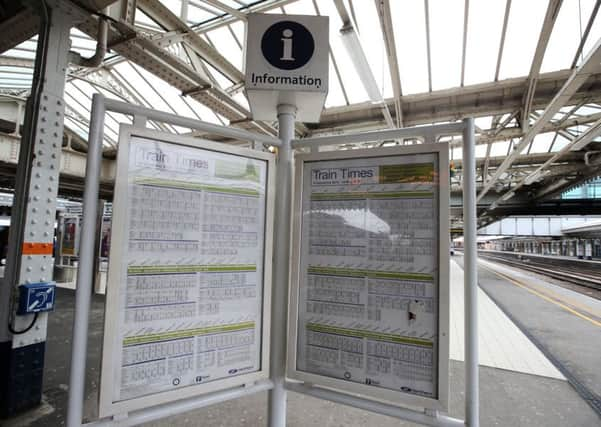David Behrens: Passenger power - not nationalisation - can fix our broken railways


No-one, it said, had stepped up to take charge of the developing crisis. That much was obvious to all of us who had waited – and continue to wait – on platforms day after day for services that never arrived, and who were crammed like pigs into the vestibules of the carriages that turned up in their wake.
Instead of owning up to the damage they had caused – real, tangible harm to the economy and to the fabric of the day-to-day lives of those who travel – the train companies had pointed their fingers at each other, like naughty children caught in a lie.
Advertisement
Hide AdAdvertisement
Hide AdSo the announcement of a review into the whole industry is welcome. It is, quite literally, the least the Government could do.
But if it is to be more than just the PR exercise of which others on these pages have warned, it must get to the heart of the culture of incompetence and entitlement has defined our railways for the last generation.
Its headline conclusion was a step in the right direction. “The present industry arrangements,” it said, “do not support clarity of decision making: it was unclear who was responsible for what.”
The Transport Secretary, Chris Grayling, was still vacillating yesterday. “When you’re a politician sitting in front of leaders of the industry and they’re saying to you, ‘we’re ready’, actually to overrule them is not straightforward,” he said.
Advertisement
Hide AdAdvertisement
Hide AdYes it is. That’s exactly what effective managers do all the time.
Mr Grayling’s mistake was to assume that the people who run Network Rail, Northern Rail and TransPennine Express knew what they were doing.
He’s clearly not a regular user of any of their services.
He would not, he said, join the finger-pointing – on the basis, presumably that too many would be wagging in his own direction. But if the inquiry is to be effective it is going to have to do just that.
And, in any case, why shouldn’t people be held to account? The knowledge that under the current regime they are unlikely to be, goes right to the heart of the complacency that allowed this summer to go so spectacularly off the rails.
Advertisement
Hide AdAdvertisement
Hide AdNo-one in the industry is completely without blame, but the search for those most responsible must begin with the civil servants in Mr Grayling’s department who oversee a franchising system which consistently picks the wrong horses, which rewards mediocrity and is strong-armed by corporate interests.
The evidence for its failings could hardly be clearer: fully 25 years after privatisation it has yet to find a sustainable franchisee for the East Coast main line between Yorkshire and the capital, a contract that should be the jewel in the industry’s crown.
Yet calls to renationalise the system, which emanated once more from Labour yesterday – miss the point. It makes no difference whether the money comes from the state or from the market if the people managing it don’t know or even care what they’re doing with it.
The proof of this is the sad story of Railtrack, the infrastructure company set up as a private concern when British Rail was done away with. A lot of investors lost their shirts because they thought the release on to the open market of a national asset would unleash a golden goose. They failed to recognise that inside the organisation, nothing had changed. The same, institutionalised people were left to carry on regardless and to run up £7bn of debts, forcing the Government to take it back in-house.
Advertisement
Hide AdAdvertisement
Hide AdThat’s how the state-owned Network Rail was born, and it was its failure to deliver projects in the North on time that was at the root of the timetable chaos. So much for nationalisation.
There are more constructive avenues that the inquiry must explore, and empowering passengers is at their heart.
First, it must incentivise effort on the part of Northern Rail and other contractors for whom commuters are merely the cargo their contracts require them to carry. A new charter for travellers must ensure automatic compensation whenever trains are more than 10 minutes late at any station; and it must require passengers to be told of the reason for any delay within two minutes of it occurring.
Passenger satisfaction must also be factored into the franchises, with financial penalties if targets are not met. And there must be an ombudsman to whom complaints can be escalated.
Advertisement
Hide AdAdvertisement
Hide AdThe unions, too – especially the persistently-striking RMT – must be brought into line. The days of clinging to job descriptions that ceased to be relevant in 1985 are over.
But overwhelmingly, as yesterday’s draft recognised, there must be someone at the top whose job it is to knock heads together – something which Mr Grayling could and should have done six months ago.